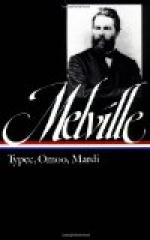“But his body is his own, Babbalanja; and he should have it under better control.”
“The common error, my lord. Our souls belong to our bodies, not our bodies to our souls. For which has the care of the other? which keeps house? which looks after the replenishing of the aorta and auricles, and stores away the secretions? Which toils and ticks while the other sleeps? Which is ever giving timely hints, and elderly warnings? Which is the most authoritative?—Our bodies, surely. At a hint, you must move; at a notice to quit, you depart. Simpletons show us, that a body can get along almost without a soul; but of a soul getting along without a body, we have no tangible and indisputable proof. My lord, the wisest of us breathe involuntarily. And how many millions there are who live from day to day by the incessant operation of subtle processes in them, of which they know nothing, and care less? Little ween they, of vessels lacteal and lymphatic, of arteries femoral and temporal; of pericranium or pericardium; lymph, chyle, fibrin, albumen, iron in the blood, and pudding in the head; they live by the charity of their bodies, to which they are but butlers. I say, my lord, our bodies are our betters. A soul so simple, that it prefers evil to good, is lodged in a frame, whose minutest action is full of unsearchable wisdom. Knowing this superiority of theirs, our bodies are inclined to be willful: our beards grow in spite of us; and as every one knows, they sometimes grow on dead men.”
“You mortals are alive, then, when you are dead, Babbalanja.”
“No, my lord; but our beards survive us.”
“An ingenious distinction; go on, philosopher.”
“Without bodies, my lord, we Mardians would be minus our strongest motive-passions, those which, in some way or other, root under our every action. Hence, without bodies, we must be something else than we essentially are. Wherefore, that saying imputed to Alma, and which, by his very followers, is deemed the most hard to believe of all his instructions, and the most at variance with all preconceived notions of immortality, I Babbalanja, account the most reasonable of his doctrinal teachings. It is this;—that at the last day, every man shall rise in the flesh.”
“Pray, Babbalanja, talk not of resurrections to a demi-god.”
“Then let me rehearse a story, my lord. You will find it in the ’Very Merry Marvelings’ of the Improvisitor Quiddi; and a quaint book it is. Fugle-fi is its finis:—fugle-fi, fugle-fo, fugle-fogle-orum!”
“That wild look in his eye again,” murmured Yoomy. “Proceed, Azzageddi,” said Media.




